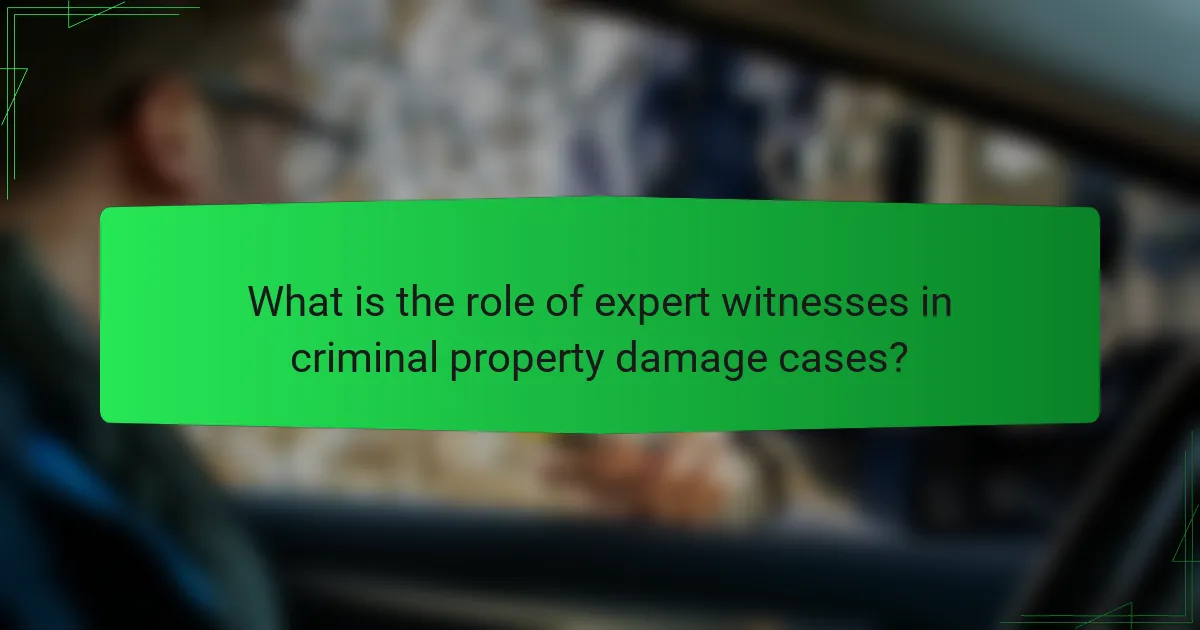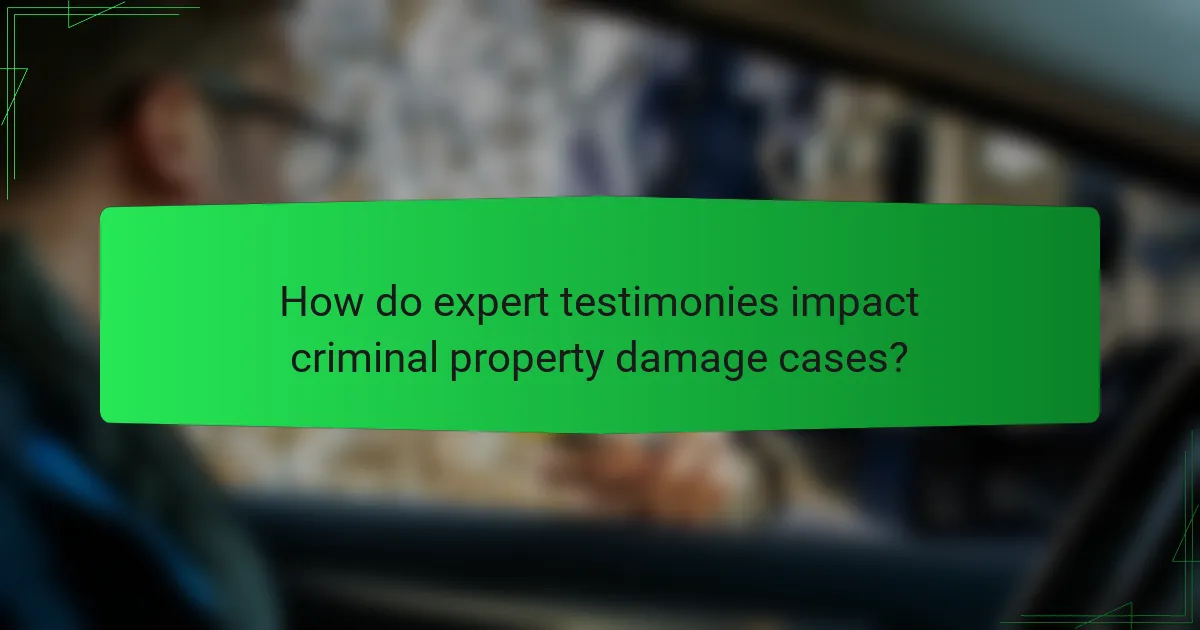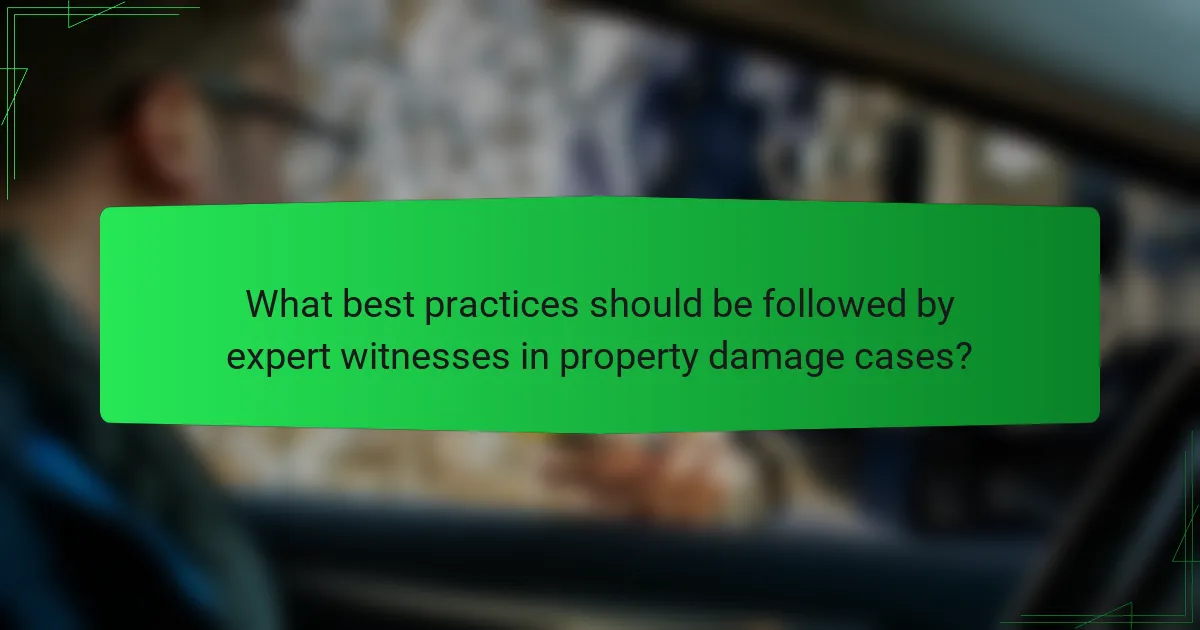Expert witnesses play a critical role in criminal property damage cases by providing specialized knowledge that aids the court in understanding complex issues. Their analyses of evidence, including damage assessments and forensic findings, help clarify technical aspects and establish causation in disputes. With qualifications such as advanced degrees and relevant professional experience, expert witnesses ensure their testimonies are credible and trustworthy. Best practices for these professionals include maintaining objectivity, thorough preparation for court appearances, and clear communication of their findings. The impact of expert witnesses is significant, as their insights can influence case outcomes and contribute to fair compensation for damages.

What is the role of expert witnesses in criminal property damage cases?
Expert witnesses provide specialized knowledge in criminal property damage cases. They analyze evidence related to the damage and offer opinions based on their expertise. Their testimony can clarify technical aspects for the court. This includes assessing the extent of damage and estimating repair costs. Expert witnesses may also help establish causation in disputes. Their qualifications often include advanced degrees or relevant professional experience. Courts rely on their insights to make informed decisions. This role is crucial in ensuring justice and fair compensation.
How do expert witnesses contribute to legal proceedings?
Expert witnesses contribute to legal proceedings by providing specialized knowledge and opinions. They help clarify complex subjects for judges and juries. Their expertise can significantly influence case outcomes. Expert witnesses often prepare reports summarizing their findings. They may also testify in court, offering insights based on their qualifications. Their testimony can validate or challenge evidence presented by other parties. This can affect the credibility of the arguments made. Research shows that expert testimonies can sway jury decisions, highlighting their importance in legal contexts.
What specific functions do expert witnesses perform in court?
Expert witnesses perform several specific functions in court. They provide specialized knowledge relevant to the case. This knowledge aids judges and juries in understanding complex issues. Expert witnesses may analyze evidence and present findings. They often prepare reports summarizing their conclusions. In court, they testify to their expertise and findings. Their testimony can clarify technical details for non-experts. Additionally, they may assist in formulating questions for further investigation. Overall, their role enhances the understanding of the case’s technical aspects.
How do expert witnesses establish credibility in their testimonies?
Expert witnesses establish credibility in their testimonies through relevant qualifications and experience. They possess advanced degrees or certifications in their field. This educational background demonstrates their expertise. They also have practical experience related to the case at hand. This experience often includes years of work in their specialty.
Additionally, expert witnesses may have published research or articles in peer-reviewed journals. Such publications serve as evidence of their knowledge and authority. They often provide clear, objective explanations during testimonies. This clarity helps juries understand complex topics.
Moreover, expert witnesses are subjected to rigorous questioning during cross-examinations. Their ability to defend their opinions under scrutiny further establishes their credibility. Courts often consider their previous testimony records and reputation in the field. All these factors contribute to the overall trustworthiness of their testimonies.
What qualifications are necessary for expert witnesses?
Expert witnesses must possess specialized knowledge, skills, or experience relevant to the case. This expertise is typically demonstrated through formal education, professional certifications, or extensive work experience in a specific field. For example, a forensic engineer may require a degree in engineering and relevant certifications. Additionally, expert witnesses should have the ability to communicate complex information clearly. Courts often assess an expert’s qualifications based on their publications, prior testimonies, and peer recognition in their field. These criteria ensure that the expert’s opinions are credible and admissible in court.
What educational background is typically required?
Typically, expert witnesses in criminal property damage cases require a background in a relevant field, such as engineering, architecture, or forensic science. This educational foundation equips them with the necessary knowledge to analyze evidence and provide informed opinions. A bachelor’s degree is often the minimum requirement, while many hold advanced degrees for credibility. Specialized training or certifications in their area of expertise further enhance their qualifications. For instance, forensic engineers may have additional certifications from professional organizations. This educational background is essential for establishing authority and reliability in court.
What professional experience enhances an expert witness’s qualifications?
Relevant professional experience includes specialized training, certifications, and practical experience in a specific field. Expert witnesses benefit from extensive knowledge gained through years of practice. Experience in relevant industries enhances credibility and reliability in court. For example, a forensic engineer with years of experience can provide insights into structural failures. Similarly, a medical professional with clinical experience can accurately assess injuries. Academic qualifications also contribute significantly to an expert witness’s authority. Courts often favor witnesses with advanced degrees or specialized certifications. This combination of experience and education solidifies an expert witness’s qualifications in legal proceedings.
What types of expert witnesses are commonly involved in property damage cases?
Common types of expert witnesses in property damage cases include forensic engineers, appraisers, and environmental specialists. Forensic engineers analyze structural failures and determine causes of damage. Appraisers assess property value and damage extent. Environmental specialists evaluate contamination and environmental impacts. These experts provide testimony based on their specialized knowledge. Their insights help clarify complex issues for judges and juries. The involvement of these experts can significantly influence case outcomes.
What are the different fields of expertise relevant to property damage?
The different fields of expertise relevant to property damage include engineering, architecture, construction, and environmental science. Engineering experts assess structural integrity and design flaws. Architects provide insights on design compliance and safety regulations. Construction professionals evaluate workmanship and material quality. Environmental scientists analyze damage caused by natural elements or pollutants. Each field contributes specialized knowledge crucial for accurate property damage assessments. For instance, structural engineers often conduct forensic investigations to determine failure causes, reinforcing their role in legal cases.
How do specialized expert witnesses differ in their approaches?
Specialized expert witnesses differ in their approaches based on their specific fields of expertise. Each expert applies unique methodologies tailored to their discipline. For instance, a forensic engineer assesses structural damage using engineering principles. In contrast, a forensic accountant evaluates financial records through accounting standards. Their approaches also vary in terms of the types of evidence they prioritize. Some experts may focus on physical evidence, while others emphasize documentation or financial analysis. Additionally, their communication styles can differ significantly. Some experts may present complex technical information in layman’s terms. Others might use detailed technical jargon suited for industry professionals. These differences impact how effectively they convey their findings in court. Ultimately, the diversity in approaches reflects the varied nature of expertise required in criminal property damage cases.

How do expert testimonies impact criminal property damage cases?
Expert testimonies significantly impact criminal property damage cases by providing specialized knowledge. These testimonies help clarify complex issues for judges and juries. Experts can analyze evidence, such as damage assessments and forensic findings. Their insights often influence the credibility of claims made by both sides. For instance, a forensic engineer may explain how damage occurred. This can affect the determination of liability. Studies show that cases with expert witnesses tend to have higher success rates. Their authority can sway juror perceptions and decisions.
Why is expert testimony crucial in establishing facts?
Expert testimony is crucial in establishing facts because it provides specialized knowledge that informs legal proceedings. Experts possess qualifications and experience that enable them to interpret complex information. Their insights help clarify technical aspects of cases, making them understandable for judges and juries. For instance, in criminal property damage cases, an expert can explain the mechanics of damage assessment. This expertise enhances the credibility of evidence presented in court. Studies show that juries are more likely to trust information supported by expert testimony. Therefore, expert witnesses play a vital role in ensuring accurate fact-finding.
How does expert testimony influence jury decisions?
Expert testimony significantly influences jury decisions by providing specialized knowledge that aids in understanding complex evidence. Jurors often rely on expert opinions to interpret technical details beyond their expertise. This can shape their perceptions of credibility and reliability in the case. Studies show that jurors are more likely to favor a verdict aligned with the expert’s testimony. For instance, a 2011 study published in the Journal of Forensic Sciences demonstrated that jurors’ decisions were swayed by expert witnesses’ credibility. The presence of an expert can enhance the persuasive power of evidence presented during the trial. Thus, expert testimony plays a crucial role in guiding jurors’ conclusions in criminal property damage cases.
What challenges do expert witnesses face in providing testimony?
Expert witnesses face several challenges in providing testimony. One significant challenge is the complexity of the subject matter. Many cases involve intricate technical details that can be difficult to explain clearly. This complexity can lead to misunderstandings by jurors or judges.
Another challenge is the potential for bias. Expert witnesses may be perceived as biased if they have been retained by one party. This perception can undermine their credibility. Additionally, experts must remain impartial, even when they have strong opinions about the case.
Communication is also a critical challenge. Experts must convey their findings in a way that is accessible to a lay audience. Legal jargon or overly technical language can alienate jurors.
Time constraints can further complicate the situation. Experts often have limited time to prepare their testimony. This can affect the depth and quality of their analysis.
Finally, cross-examination poses a significant challenge. Opposing counsel may attempt to discredit the expert’s qualifications or findings. This can create pressure and may impact the expert’s performance during testimony.
What methods do expert witnesses use to present their findings?
Expert witnesses use various methods to present their findings effectively. They often utilize written reports that detail their analysis and conclusions. These reports are structured to be clear and concise, adhering to legal standards. Visual aids, such as charts and graphs, are also commonly employed to illustrate complex data. Expert witnesses may present their findings in court through oral testimony. During testimony, they explain their methodology and answer questions posed by attorneys. Demonstrative evidence, like models or simulations, can enhance understanding. They may also participate in depositions to provide sworn statements. These methods ensure that their findings are comprehensible and impactful in legal proceedings.
How do visual aids enhance the effectiveness of expert testimonies?
Visual aids enhance the effectiveness of expert testimonies by improving comprehension and retention of information. They provide a visual context that complements verbal explanations. This dual-channel processing engages both auditory and visual learning pathways. Jurors and judges can better understand complex concepts when visual representations are used. Studies show that information retention increases by up to 65% when visuals are included. Visual aids also help clarify technical details that may be difficult to convey through words alone. They serve to simplify intricate data, making it more accessible. Overall, visual aids strengthen the persuasive impact of expert testimonies in legal settings.
What role does report writing play in the testimony process?
Report writing is essential in the testimony process as it provides a structured account of findings. Expert witnesses use reports to summarize their observations and analyses. These reports serve as a reference during testimonies, ensuring consistency in statements. They also help clarify complex information for the court. Accurate reports can enhance the credibility of the expert witness. Furthermore, they facilitate the understanding of evidence by legal professionals. A well-documented report can influence the outcome of a case significantly. In summary, report writing is a crucial tool that supports effective testimony in legal proceedings.
What are the potential consequences of expert testimonies?
Expert testimonies can significantly influence legal outcomes. They can validate or challenge evidence presented in court. A credible expert can enhance the persuasiveness of a case. Conversely, a discredited expert can undermine a party’s position. The outcome may affect sentencing, damages awarded, or case dismissal. Studies show that juries often rely on expert opinions for complex issues. This reliance can lead to biased interpretations if the expert is not impartial. Therefore, expert testimonies carry weight in shaping judicial decisions.
How can expert testimonies lead to case dismissals or convictions?
Expert testimonies can significantly influence case dismissals or convictions. They provide specialized knowledge that can clarify complex issues for the court. This expertise can either support the prosecution’s claims or bolster the defense’s arguments. For instance, a forensic expert may analyze evidence and present findings that challenge the credibility of the prosecution’s case. Conversely, an expert may validate the prosecution’s evidence, leading to a stronger case against the defendant.
In many cases, the credibility of the expert witness can sway a judge or jury’s decision. Studies show that jurors often rely on expert testimonies to make informed decisions. For example, a study published in the Journal of Forensic Sciences found that expert testimony significantly impacted jury verdicts in 70% of cases analyzed. Thus, the presence and quality of expert testimonies can be pivotal in determining the outcome of criminal property damage cases.
What impact does the credibility of an expert witness have on case outcomes?
The credibility of an expert witness significantly influences case outcomes. A credible expert witness enhances the persuasiveness of their testimony. This can lead to stronger arguments for the party they represent. Research shows that juries often rely on expert testimony to inform their decisions. A study by the National Institute of Justice found that credible expert witnesses can increase the likelihood of favorable verdicts. Conversely, a lack of credibility can undermine an expert’s testimony. This may result in diminished trust from the jury. Ultimately, the expert’s credibility directly affects the perceived strength of the evidence presented.

What best practices should be followed by expert witnesses in property damage cases?
Expert witnesses in property damage cases should adhere to several best practices. They must maintain objectivity and impartiality throughout the case. This ensures their testimony is credible and trustworthy. Expert witnesses should also possess relevant qualifications and experience in their field. This establishes their authority and enhances their reliability.
Additionally, they should prepare thoroughly for depositions and court appearances. This preparation includes reviewing case materials and understanding the specifics of the damage. Clear and concise communication is vital. Expert witnesses should present their findings in an understandable manner for judges and juries.
Documentation of their analyses and conclusions is essential. This provides a solid foundation for their testimony. Lastly, they should remain updated on industry standards and practices. This ongoing education reinforces their expertise and relevance in court.
How can expert witnesses prepare effectively for court appearances?
Expert witnesses can prepare effectively for court appearances by thoroughly reviewing case materials and understanding the relevant facts. They should familiarize themselves with the legal standards applicable to their testimony. Additionally, expert witnesses must practice clear and concise communication of complex information. Engaging in mock trials can enhance their confidence and presentation skills. They should also anticipate potential questions from both the prosecution and defense. Understanding courtroom procedures is crucial for a smooth appearance. Finally, maintaining professionalism and composure during testimony is essential for credibility. These preparation steps are critical for effective participation in court.
What strategies can enhance the clarity of expert testimony?
Using clear language enhances the clarity of expert testimony. Experts should avoid jargon and technical terms unless necessary. Simplifying complex concepts makes them more accessible to the audience. Visual aids can also help illustrate key points effectively. Organizing testimony logically aids comprehension. Providing concrete examples supports claims and enhances understanding. Practicing delivery ensures confidence and clarity during presentation. Engaging the audience with questions fosters interaction and retention of information.
How can expert witnesses manage cross-examination effectively?
Expert witnesses can manage cross-examination effectively by preparing thoroughly in advance. They should review their reports and relevant materials to ensure familiarity with the case details. Clear and concise communication is essential during testimony. Expert witnesses must listen carefully to questions before responding. This helps them avoid misunderstandings. Maintaining composure under pressure is crucial. They should remain calm and professional, regardless of the tactics used. Using straightforward language aids in conveying complex concepts. This ensures that the jury understands their expertise. Additionally, expert witnesses should anticipate challenging questions and prepare responses. This proactive approach enhances their credibility. Research shows that well-prepared witnesses are more likely to withstand tough cross-examination successfully.
The main entity of the article is expert witnesses in criminal property damage cases. The article provides an in-depth examination of the qualifications, roles, and impacts of expert witnesses in legal proceedings related to property damage. It discusses their specialized knowledge, the importance of their testimonies in clarifying complex issues for judges and juries, and the various fields of expertise relevant to property damage cases. Additionally, it outlines best practices for expert witnesses, including preparation strategies for court appearances and effective management of cross-examination. Overall, the article highlights the critical role expert witnesses play in ensuring informed judicial decisions and fair outcomes in criminal property damage cases.